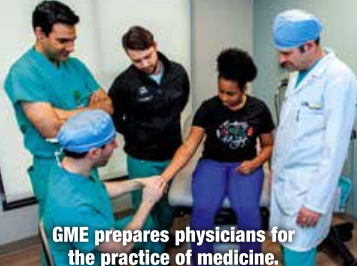GRADUATE MEDICAL EDUCATION

What is it, and why is it so important?
Did you realize that newly minted doctors are not eligible to begin seeing patients after graduating from medical school? This is largely due to doctors of the 1900s expressing the need for more medical training, so Graduate Medical Education was born.
 Graduate Medical Education (GME), as defined by the Accreditation Council for Graduate Medical Education (ACGME), is “the period of didactic and clinical education in a medical specialty or subspecialty which follows the completion of undergraduate medical education and which prepares physicians for the independent practice of medicine in that specialty or subspecialty.”
Graduate Medical Education (GME), as defined by the Accreditation Council for Graduate Medical Education (ACGME), is “the period of didactic and clinical education in a medical specialty or subspecialty which follows the completion of undergraduate medical education and which prepares physicians for the independent practice of medicine in that specialty or subspecialty.”
During the 18th century and for several decades into the 19th century, most physicians in the United States received their training as apprentices to practicing physicians. After the Civil War (1861-1865), numerous medical schools were established due to the charge of apprentice fees for attending didactic lectures as a supplement to training by a practicing physician. Medical societies began to call for reform of medical education, with the New York Medical Society coordinating the first national meeting in May of 1846, resulting in the formation of the American Medical Association (AMA). Minimal standards were then set to address the issue of many medical schools focusing on the financial gain without admission criteria or uniformity in their curriculums. These financially motivated institutions were awarding MDs after less than six months of instruction.
By the 1900s, a four-year course of at least six months each year was required to obtain a Doctor of Medicine (MD) degree, which provided the right to take a licensure exam, not to practice medicine. Admission into medical school required a high school diploma or two years of college. In 1905, the newly created Council on Medical
Education and Hospitals took further stock of the status of medical education and recommended an “ideal standard.” Thus, universities began to provide a five-year medical course with the first year devoted to physics, chemistry and biology, and the next two years to laboratory sciences of anatomy, physiology, pathology and pharmacology. The final two years were spent in clinical settings with close contact with patients. A sixth year was spent as an intern, what is now known more commonly as a resident.
By 1912, the Council on Medical Education began identifying hospitals as sites for hosting internship programs. The first list of such hospitals, published in 1914, identified 603 hospitals offering 3,095 positions. In 1927, the Shreveport Charity Hospital was approved for 10 internships. The intern was paid $10 per month and lived at the facility.
Fast forward almost 100 years, and LSU Health Shreveport now has over 600 residents and fellows engaged in Graduate Medical Education. These individuals train in 51 clinical sites throughout north and central Louisiana. They are engaged in one of 45 accredited medical programs or three accredited dental programs. The six-person Graduate Medical Office, 29 program administrators, 45 program directors and three GME specialists support this critical component of producing a practicing physician. The rigor of today’s residency and fellowship programs is closely monitored to ensure compliance with ACME requirements. These behind-the-scenes professionals who manage compliance while providing administrative, organizational and emotional support for residents and fellows will be honored on Aug. 19 on national Graduate Medical Education Professionals Day.
So, the next time you see your physician, remember their extraordinary investment of time, money and intellectual efforts and those who supported them behind the scenes. As the saying goes, it takes a village.
Leisa Oglesby, BSRN, MBA, CPHQ, is the executive director for medical services and designated institutional officer. LSU Health Shreveport.
